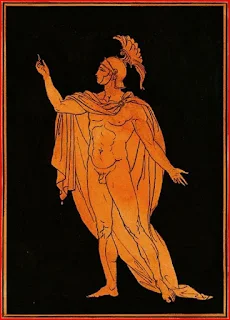Dramatic Suspense of Agamemnon's Home Coming in the Play “Agamemnon”
“Agamemnon” is the masterpiece of Aeschylus. In it the action takes place before the palace of Agamemnon in Argos at the time of his victorious return from the Trojan War. Besides, the grand theme of the play based on sin, murder, punishment and a fatalistic conception of human life', the intense dramatic suspense around Agamemnon's homecoming occupies an important theme of the play. The suspense is created before Agamemnon's arrival by the speeches of Watchman, Elders of Argos, Herald and so on. There is hope and also forbidding in the speeches.
The dramatic suspense is
firstly created by the Watchman who waits in the dead of night and suddenly
sends out a cry of joy as the signal blazes forth announcing the imminent
return of Agamemnon. The Watchman strikes the first note of approaching
calamity by guarded hints and allusion to Clytemnestra's adulterous relation
with Aegisthus, Agamemnon's mortal enemy.
Dramatic suspense lies
among the mixed feeling in the expression of Chorus. The Chorus' emphasis is
stronger on foreboding. It is not only Clytemnestra who arouses their fear -
they trust Agamemnon to find a way to deal with her when he returns, but they
know that the King himself is burdened with guilt. They recount in detail how
Agamemnon, inheriting the family curses from Atreus; found himself faced with a
fearful dilemma, and made the wrong choice to sacrifice his daughter.
The Watchman descends
and another dramatic suspense starts by a cry of triumph from Clytemnestra and
is echoed by other women. The hurried coming of a messenger followed by the
attendants, going in various directions, and carrying jars and bowls with oil
and incense for sacrifice increase the suspenseful situation. There is suspense
in the circumlocutory speeches of the chorus and their conversations and
interrogation with Clytemnestra. Clytemnestra creates confusion and suspicion
by her speeches when she herself says that the victors would avoid being
vanquished in their turn. Clytemnestra says that only, let no lust of unlawful
plunder tempt the soldiers' hearts with wealth, to their own harm. .
Clytemnestra finishes
her words by saying that these are a woman's words while the chorus says that
your words are like a man's. After the finishing of chorus' speech suspense
arises when the sound of women voices excitedly begins the shout and cheer. One
or two Elders go out, and return immediately to report the following remarks as
made severally by various members of the chorus.
All doubts that remain
about the truth of the beacon message are now dispelled by the arrival of the
herald from the Trojan expeditionary force. This herald concludes the precious suspense
but loads immense suspense in his speeches. The herald announces that
Agamemnon, homeward bound has been separated from the rest of his fleet.
The opening scene of Aeschylus’s “Agamemnon” prepares the audience psychologically for the events
to come later. It introduces Clytemnestra, the most dominant character of the
play, as a female having male traits. The watchman informs us of the unrest
inside and outside the Argos palace at the prolonged absence of Agamemnon.
Thus, Aeschylus in his tragedy “Agamemnon”
creates dramatic suspense around Agamemnon's homecoming and it enhances the
dramatic brilliance of the tragedy to a great extent.


No comments:
Post a Comment